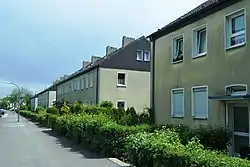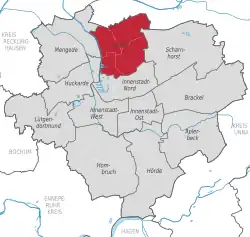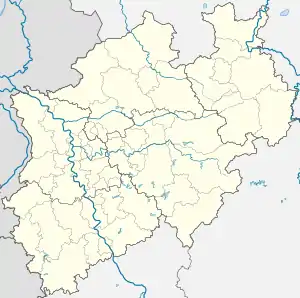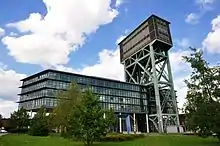Eving
Eving is a Stadtteil (quarter) in the eponymous Stadtbezirk ("city borough") in the north of the city of Dortmund, Germany. It was incorporated into Dortmund in 1914.
Eving | |
|---|---|
 Typical row of houses | |
Location within Dortmund  | |
 Eving  Eving | |
| Coordinates: 51.5528°N 7.4744°E | |
| Country | Germany |
| State | North Rhine-Westphalia |
| City | Dortmund |
| Area | |
| • Total | 22.89 km2 (8.84 sq mi) |
| Elevation | 93 m (305 ft) |
| Population (2020-12-31)[1] | |
| • Total | 38,687 |
| • Density | 1,700/km2 (4,400/sq mi) |
| Time zone | UTC+01:00 (CET) |
| • Summer (DST) | UTC+02:00 (CEST) |
| Dialling codes | 0231 |

With a population of about 20,000 Eving is one of the most populated parts of Dortmund. The population of the Stadtbezirk, which also includes Brechten, Holthausen, Lindenhorst and Kemminghausen, is about 36,000.
Eving's unemployment rate is high and the average income is low compared to the city's average, which makes it one of Dortmund's socially disadvantaged areas.
The Stadtteil is famous for its history of coal mining and the football club TuS Eving-Lindenhorst, for whom Michael Zorc, Stefan Klos and Lars Ricken have played during their childhood and youth. The Zeche Minister Stein was the last active coal mine in Dortmund. It was in use until 1987.
References
- "Bevölkerung nach Geschlecht und Staatsangehörigkeit in den Statistischen Bezirken am 31.12.2020" (PDF). Stadt Dortmund. Retrieved 28 September 2021.